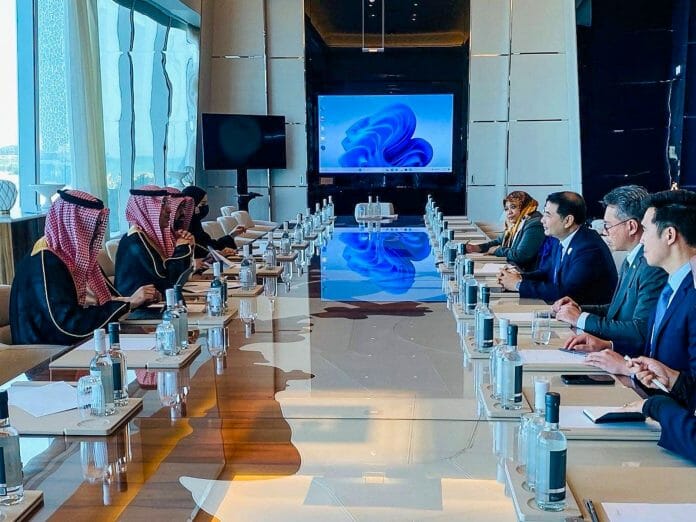The Leaders and business community from the Gulf Nations, as well as the international investor community have given a rousing thumbs up responding positively in moving towards greater economic cooperation with Malaysia.
Minister of Economy Rafizi Ramli said the favourable response received was, at the forefront, the strongest political stability experienced by Malaysia since 2004 with a two-thirds majority helmed by the Unity Government which ensures the continuity of policy and national economic leadership; and the strong aspiration posed in leading the energy transition in Southeast Asia, which is able to create investment opportunities amounting to RM637 billion for a period of 20 years in future which opens up space for more investment opportunities.
Rafizi, in a statement released by the ministry today (June 1), added Malaysia’s competitiveness in terms of more affordable business cost compared to other countries in the region, taking into account the quality of infrastructure and workforce that Malaysia has, augurs well with the community presently.
The minister explained that he was given the opportunity to lead the Malaysian delegation to the Qatar Economic Forum (QEF) which took place from 23 to 25 March 2023. QEF is one of the world’s largest investor and economic forum focused on collaboration and investment from the countries of the Gulf region (Saudi Arabia, Qatar, UAE and others) with other countries around the world.
QEF had also dedicatedan interview slot by Bloomberg, for me to present the investment potential and growth prospects which exists in the Malaysian economy.
In addition to repeating Malaysia’s encouraging economic performance as of the first quarter of 2023, Rafizi presented the nation’s economic restructuring plan to the world investor community, especially on the government’s efforts to strengthen the country’s fiscal position by giving focus on government financial governance management and the retargeting of energy subsidies which had begun. This step will help Malaysia succeed in helping the government comply with the deficit reduction target of 3.5% of the Gross Domestic Product (GDP) by 2025, thereby reducing the accumulated debt of the government which is now constraining national economic growth.
The QEF also witnessed Rafizi discussing the government’s strategic plan that would make Malaysia an energy transition regional leader in Southeast Asia. Specicifally, the government has announced several key policies such as allowing trade in renewable energy which involve cross-border renewable energy (RE), the establishment of a regional market for buying and selling RE and doubling the RE generation capacity target to 70% out of the total energy generation capacity by 2050.
“To further strengthen Malaysia’s capability as being a high performing key player in the semiconductor and computer chip industry, the nation is able to to take advantage of future demand towards high-performance computer chips due to increased need for generative artificial intelligence applications,” the forum heard.
Rafizi also met with the ministers of finance and heads of investment agencies from the Gulf countries, including, TYT Ali bin Ahmed Al-Kuwari, Minister of Finance of Qatar, TYT Mohamed bin Abdullah Al-Jadaan, Minister of Finance of Saudi Arabia, TYT Mansour Ebrahim Al-Mahmoud, CEO of Qatar Investment Corporation, Abdulla Mubarak Al-Khalifa, Chairman/CEO of Qatar National Bank, TYT Yousuf Mohamed Al Jait, CEO of Qatar Financial Centre and Abdullah bin Hamad Al Attiyah, CEO of Qatari Diar Real Estate Investment Company.
In addition to discussing potential joint investment and economic cooperation between Qatar, Saudi Arabia and Malaysia in the field of energy transition and digital economy, Rafizi had also explored joint investment opportunities with Qataris Diar in the urban regeneration sector (urban rejuvenation).
Qatari Diar is one of the largest real estate investment companies in the world with real estate investment amounting to USD35 billion (RM160 billion) in 20 countries, including major projects such as Downtown Washington DC, East Village London, The Jacx New York and others.
“I will present to the Cabinet the next steps to develop potential joint investments with Qatar in the form of a Malaysia-Qatar Comprehensive Economic Cooperation Agreement, so that these potentials can be translated into economic profit as soon as possible,” said Rafizi.









